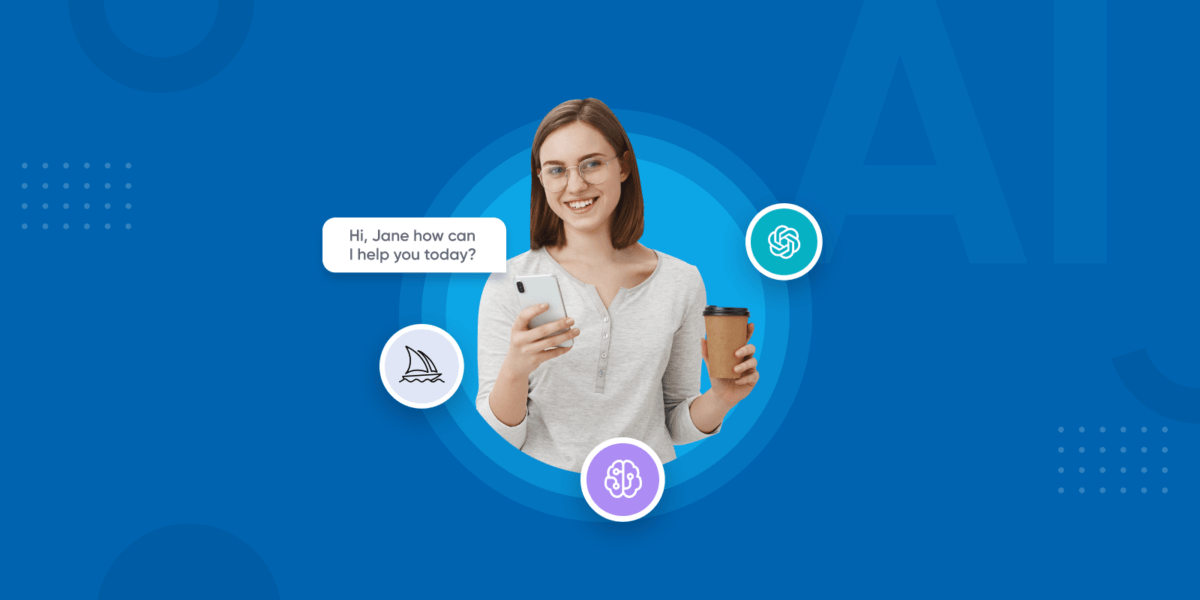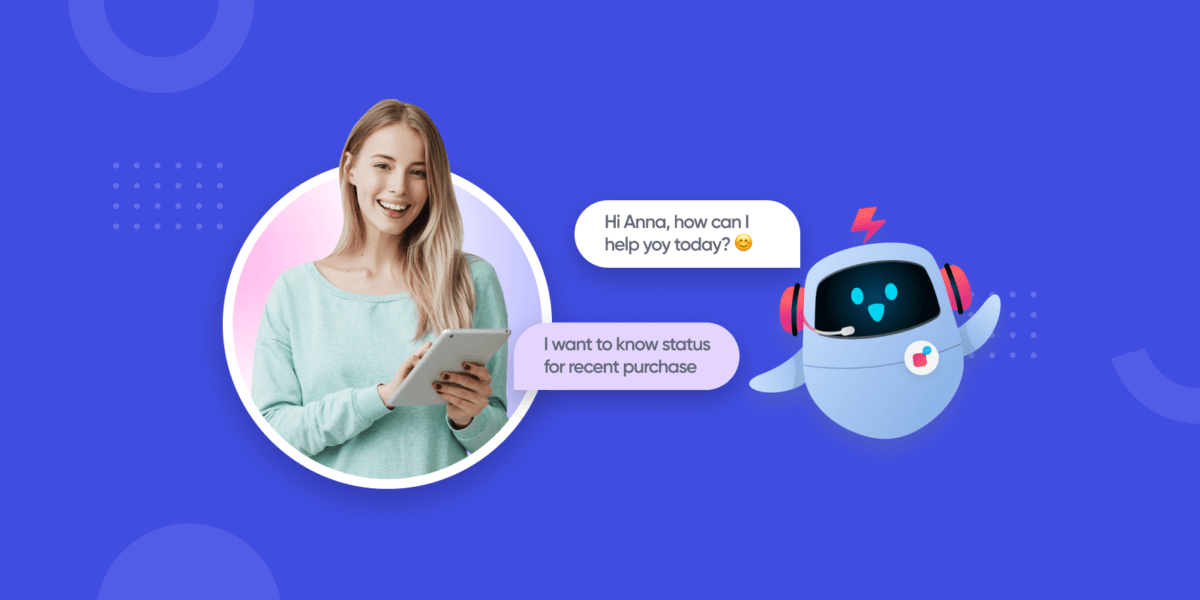Exploring the Generative AI Landscape: A Comparative Analysis of ChatGPT, Bard, and Bing Chat

Exploring the Generative AI Landscape: A Comparative Analysis of ChatGPT, Bard, and Bing Chat
Generative AI is a powerful solution that has emerged in the ever-evolving world of AI and has the incredible ability to generate human-like text and even create blockbuster films. Yes, Gartner predicts that by 2030, a major blockbuster film is expected to be released, where an astounding 90% of the film will be generated by AI, including text and video.
This showcases AI’s potential to revolutionise many diverse industries and highlights its advancements in creative applications.
But that’s not all! Gartner also predicts that by 2024, a remarkable 60% of the data used for AI and analytics projects will be synthetically generated. This means AI will craft diverse and realistic datasets, making data-driven projects more efficient and powerful.
In an interesting turn of events, three competing Generative AI tools take the stage: ChatGPT, Bing Chat, and Google Bard. Each of these exceptional tools strives to outshine the others with its unparalleled creativity and precision.
As the story unfolds, we eagerly await the wonders these AI giants will bring – seamless conversations, refined content, and data-driven marvels.
The AI adventure is just beginning, and it’s bound to shape the future of technology.
In this blog post, we will compare Google Bard, ChatGPT, and Bing AI to determine the best AI solution. We’ll explore their features, strengths, and weaknesses to identify the champion of AI solutions.
Let’s Get Down To The Basics
ChatGPT
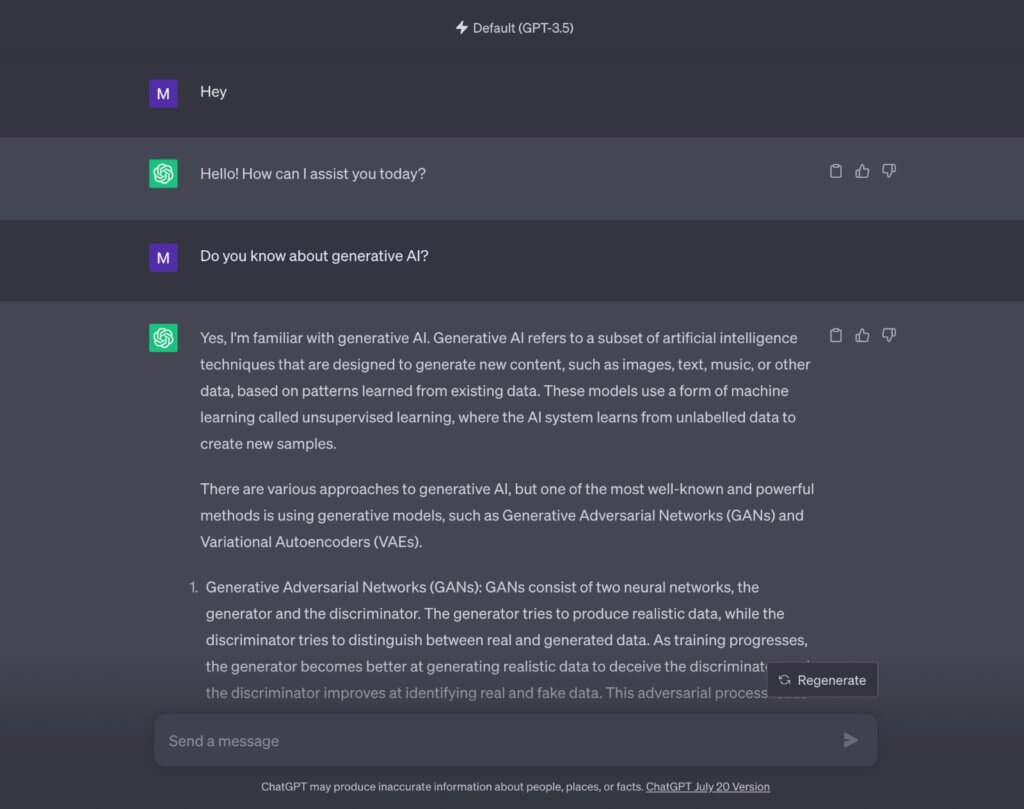
Created by OpenAI, ChatGPT has over 100 million users and 1.8 billion monthly visitors.
It uses the GPT-3.5 model, and the ChatGPT Plus subscription grants access to GPT-4 for better responses.
Some limitations include occasional inaccuracies and a lack of real-time internet access.
Google Bard
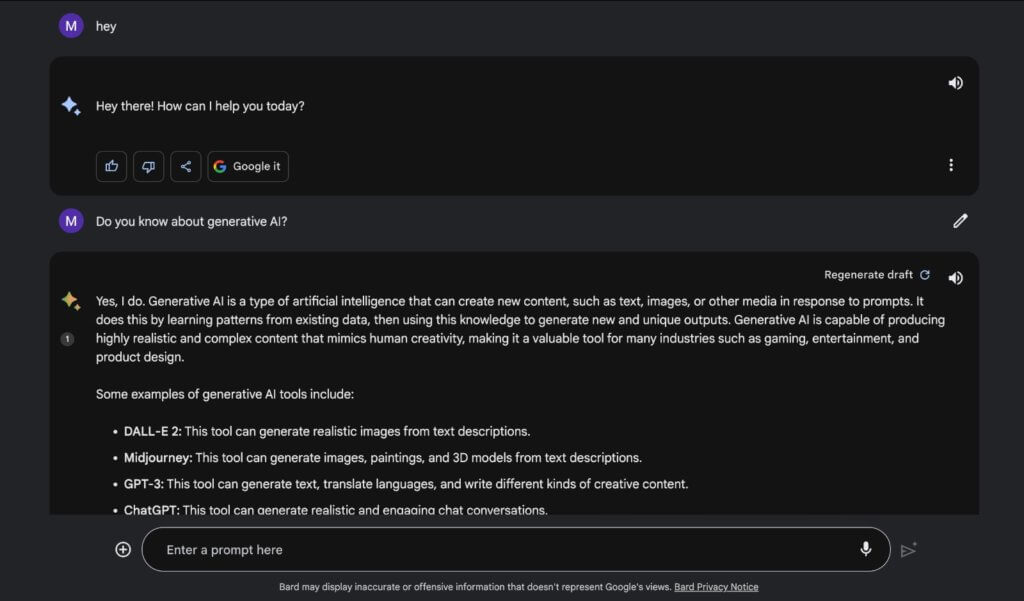
- Utilises Google’s LaMDA model and prioritises speed in responses.
- Lacks some features and may not be as accurate as other options.
- Upcoming upgrades to PaLM 2 are expected to improve its capabilities.
Bing Chat
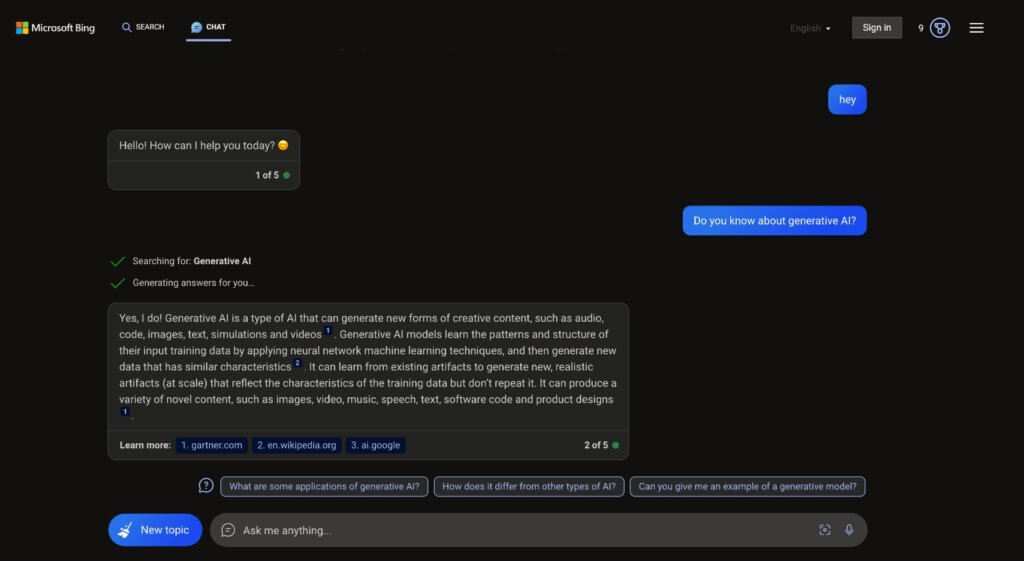
- Integrates GPT-4 and offers internet access for up-to-date results.
- Supports visual features and plugins for added functionalities.
- Daily query and message limits apply.
Suggested Reading: The Support Genius: Generative AI Tools Redefine Customer Assistance
Battle of the Generative AI Titans: Google Bard vs ChatGPT vs Bing AI!
In the AI realm, Google Bard, ChatGPT, and Bing AI each have their own unique features.
According to Acumen, the generative AI market is expected to soar to a staggering $110.8 billion USD by 2030. This projection underscores the immense growth potential that awaits these AI solutions in the years to come.
Let’s explore these significant features, strengths, and weaknesses to identify the champion of AI solutions.
1. Technology
- Google Bard employs its LaMDA model with 137 billion parameters, transitioning to a larger PaLM model with 540 billion parameters. It aims to provide original, high-quality responses through its unique training dataset.
- ChatGPT relies on the GPT-4 technology developed by OpenAI. The advanced model with one trillion parameters uses deep learning algorithms and vast text data to generate coherent and relevant responses. It is also accessible on iOS.
- Bing Chat employs the same GPT-4 model, fine-tuned using search data to personalise and enhance response accuracy.
2. Privacy
- All three AI solutions collect conversation data to improve performance, but users should be cautious about sharing sensitive information.
- Google Bard and Bing AI adhere to strict privacy standards, while ChatGPT no longer uses chat data without explicit user consent.
3. Use Cases
- Google Bard focuses on providing precise information, making it ideal for writing emails, content summaries, and search suggestions. However, it may occasionally copy content without proper credit.
- ChatGPT’s versatility shines in content generation, creative writing, digital marketing, and more. It can also generate contextual responses in continued conversations.
- Bing AI excels in providing quick and accurate answers, making it suitable for research and factual queries.
4. Response Accuracy
- Google Bard relies on search data and provides real-time statistics but may occasionally misguide users.
- ChatGPT Plus demonstrates improved accuracy, benefiting from extensive training on diverse datasets.
- Bing AI’s access to a vast knowledge base enables consistently accurate responses to straightforward questions.
5. Logical Reasoning
- Google Bard struggles with simple calculations
- Bing AI demonstrates good logical thinking in providing correct answers.
- ChatGPT is the clear winner in mathematical questions, offering explanations and step-by-step guidance.
6. Creativity
- Google Bard offers multiple variations in responses but may occasionally copy content.
- ChatGPT exhibits superior creativity without plagiarism, making it ideal for content generation and innovative ideas.
- Bing AI is fairly creative but strongly relies on contexts and prompts.
7. Conversation Fluency
- Google Bard delivers fluid conversations but lacks contextual coherence.
- ChatGPT has improved conversation fluency, using past inputs to maintain a smooth flow.
- Bing AI focuses on concise and informative responses to maintain conversational simplicity.
8. Additional Features
- Google Bard offers image outputs and voice command support for quick answers.
- ChatGPT’s web extensions bridge real-time information gaps, enabling web browsing and search results within chat conversations.
- Bing works as a web co-pilot in the Microsoft Edge browser, streamlining daily tasks with AI assistance.
9. Limitations
- Google Bard may struggle with written communication and occasionally produce irrelevant responses.
- ChatGPT Plus lacks real-world knowledge and may not ask clarifying questions, potentially leading to incorrect responses.
- Bing AI has limitations on long conversations to avoid off-topic discussions.
Generative AI Tools: Side by Side Break Down
| Feature | Chat GPT | Bing Chat | Google Bard |
| AI Model | GPT-3.5, GPT-4 (ChatGPT Plus) | GPT-4 | LaMDA |
| Internet Access | Limited (ChatGPT Plus) | Yes | Yes |
| Visual Features | No | Yes | No |
| Subscription | ChatGPT Plus ($20/month) | Free | Free |
| Daily Query Limit | No | Yes | No |
| Language Support | 26 languages (ChatGPT Plus) | Not specified | Not specified |
| Response Accuracy | Good (ChatGPT Plus) | High | Moderate |
| Creativity | High | Decent | High |
| Conversation Fluency | Improved (ChatGPT Plus) | Simple and Informative | Fluid and Conversational |
| Privacy Policy | Opt-in required for chat data sharing | Strict privacy protocols | Data collection for improvements |
| Additional Features | Web extensions for real-time information | Web co-pilot in Microsoft Edge | Image outputs, Voice commands |
| Use Cases | Content generation, Digital marketing | Research, Factual queries | Writing emails, Content summaries |
| Logical Reasoning | Good | Good | Struggles in certain calculations |
| Upcoming Upgrades | N/A | N/A | PaLM 2 improvements |
Key Takeaways – ChatGPT vs Bing Chat vs Google Bard
If we sum up this comparison, we realise that each Generative AI solution brings forth its unique strengths.
- ChatGPT displays unparalleled versatility in content generation, digital marketing, and even tackling complex mathematical questions.
- Bing Chat excels in delivering quick and accurate answers, making it the top choice for research and factual queries.
- Meanwhile, Google Bard impresses with its precision and accurate information, making it perfect for tasks like writing emails and generating content summaries.
Peering into the Crystal Ball: The Futuristic Generative AI Landscape
The future of generative AI is brimming with immense promise and potential.
With Google Bard’s upcoming PaLM 2 improvements, ChatGPT Plus’s continuous advancements, and Bing Chat’s integration with Microsoft Edge, we can expect a wave of groundbreaking features that will redefine the landscape of technology.
As we bring this comparison to a close, a sense of excitement lingers in the air for what lies ahead. The world of generative AI holds boundless opportunities where these AI solutions will continue to astound and inspire, propelling us into an era of limitless creativity and technological marvels.
The future shines brightly, and these AI champions are poised to shape a tomorrow that surpasses even our wildest imaginations.
To experience the remarkable power of generative AI in customer support firsthand, schedule a demo with the Verloop.io team. Discover how Verloop.io’s innovative generative AI tools can elevate your customer service, enhance response times, and deliver personalised interactions. The future is at our doorstep; embrace the magic of generative AI and unlock its extraordinary potential.





